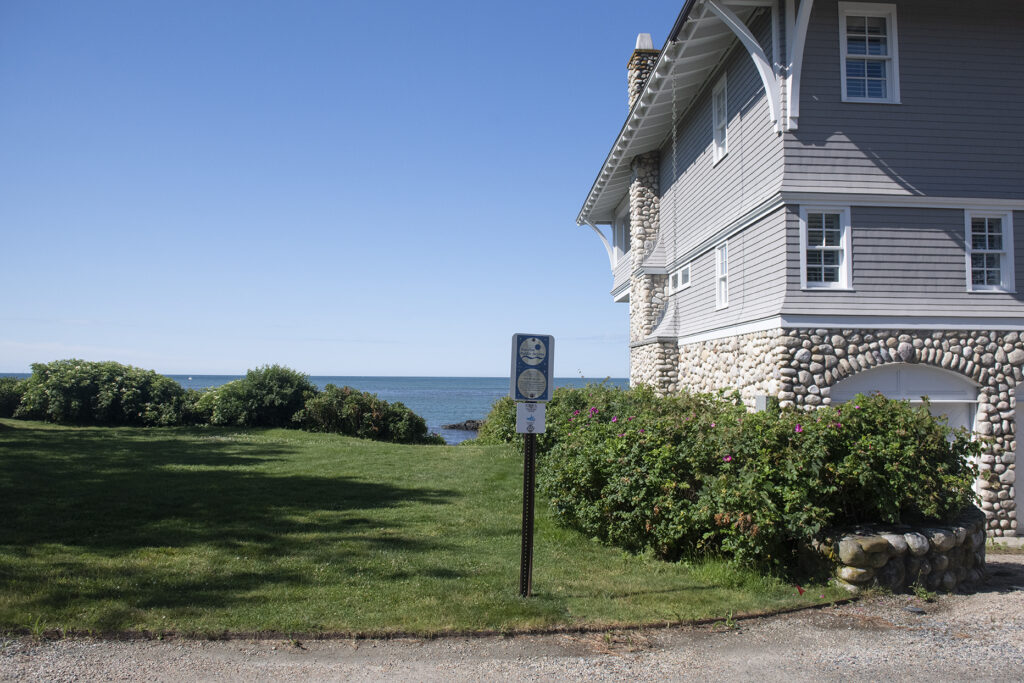Rhode Island Sea Grant Law Fellow finds short-term renters may be surprised by public access on waterfront property
Escalating conflicts over shoreline access in Rhode Island prompted the General Assembly to pass legislation in 2023 clarifying the portion of the shoreline that is deemed public. Legislators followed that up in 2024 with legislation aiming to educate new buyers of Rhode Island oceanfront property on the 2023 law and requiring sellers to disclose any rights-of-way to the shore that are located on the property.
While shoreline access advocates have hailed these measures, future improvements could close some existing gaps, according to legal research by a Rhode Island Sea Grant Law Fellow.
The 2024 law requires the seller disclose to the buyer that the public’s right to the shore extends up to 10 feet above the recognizable high tide line, as well as if there are any known rights of way on the property. The seller must also provide the buyer with copies of any Coastal Resources Management Council permits in the seller’s possession, as those may have implications for shoreline access.
“This legislation builds on the historic shoreline access law that we passed last year,” said Senator Victoria Gu (D-Dist. 38, Westerly, Charlestown, South Kingstown) in a press release provided by the General Assembly. “A lot of people in Rhode Island are now aware of the new law but a lot of people coming in from other states to buy property aren’t necessarily aware of it. This is an important consumer protection and education measure to ensure that people buying oceanfront real estate understand the public’s right to access the shoreline.”
The new law does not specify any disclosure requirements for owners of short-term rental properties, such as may be offered on Airbnb or Vrbo platforms. Thus, short-term renters may be unaware of the public shoreline access provisions on the properties they are renting, which could lead to conflicts between renters and the public exercising their shoreline access rights. Rhode Island Sea Grant Law Fellow Julia Meskis researched the law regarding shoreline real estate sales disclosures and analyzed gaps in the short-term rental registration process. She also examined Texas’ and Hawai’i’s more robust shoreline disclosure laws, which could be used as models in Rhode Island.
In Rhode Island, owners of short-term rentals who list their property on platforms like Airbnb are required to register with the Department of Business Regulation (DOBR), but this registration process does not require owners of waterfront property to disclose to renters that the public may access the shore in front of their property within a prescribed area, nor whether there are any shoreline rights-of-way or easements on the property, Meskis found. Her report suggests making a change to registration requirements that could provide renters with that information.
She also found that Texas and Hawai’i have disclosure laws that require sellers to provide buyers with information about changes in the coastal environment, such as sea level rise, and the impacts those changes may have on real property with special attention paid to public access—information that buyers, sellers, and renters in Rhode Island could benefit from.
Read Meskis’ full report, “Shoreline Property Disclosures in Rhode Island.”
The Rhode Island Sea Grant Law Fellow Program is an experiential education opportunity in which law fellows research and analyze marine law issues requested by outside professional organizations under the supervision of an attorney with the Rhode Island Sea Grant Legal Program, located at the Marine Affairs Institute at Roger Williams University School of Law.

